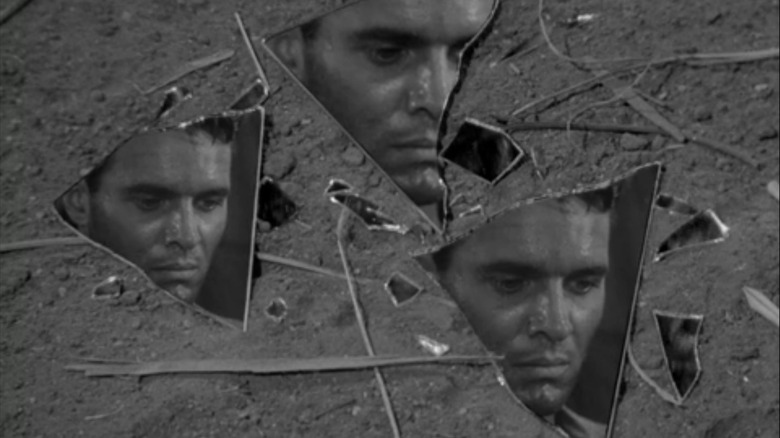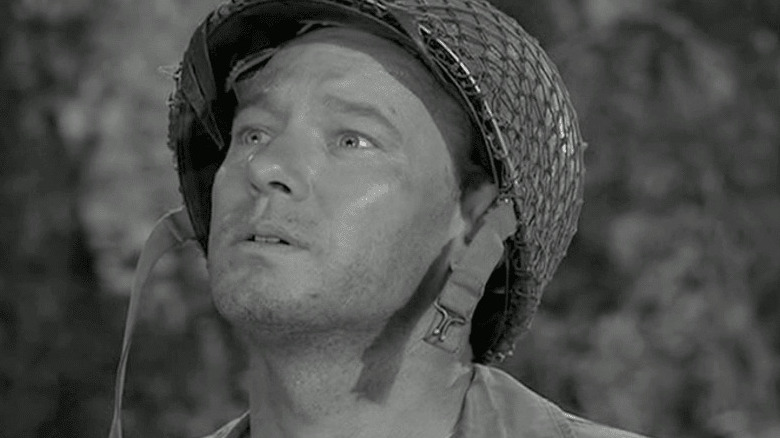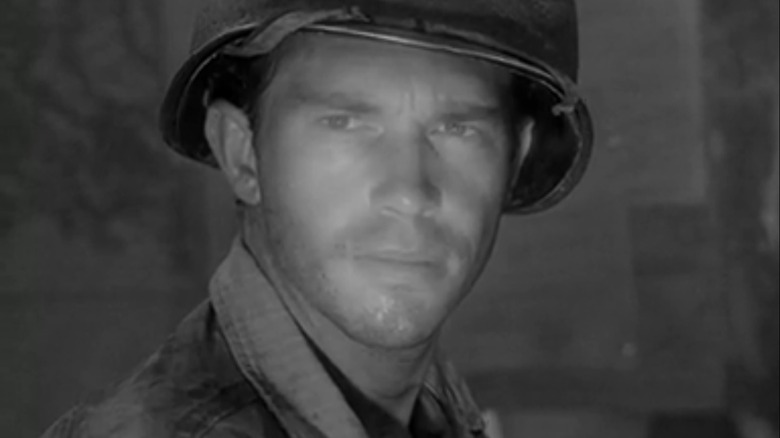The Rod Serling Mistake You Likely Never Noticed In The Twilight Zone
In the "The Twilight Zone" episode "The Purple Testament" (February 12, 1960), an American soldier named Lieutenant "Fitz" Fitzgerald (William Reynolds) fighting in World War II suddenly develops the ability to see when someone is near death. He can look at his compatriots and see an eerie glow coming from their faces. Given that this is wartime, Fitz will have plenty of opportunities to see people shortly before they die. Fitz initially tries to warn the soldiers that they are fated to be killed, but his declarations (as one might expect) prove to be damaging to the troops' morale. The story will end when Fitz sees an eerie glow coming from his own face. He drives off in a jeep with two other soldiers ... whose faces are also glowing. On the battlefield, death is inevitable.
Then Rod Serling appears to deliver his closing monologue, explaining the episode's title. He says:
"From William Shakespeare, 'Richard III,' a small excerpt. The line reads, 'He has come to open the purple testament of bleeding war.' And for Lieutenant William Fitzgerald, a company, first platoon, the testament is closed. Lieutenant Fitzgerald has found the Twilight Zone."
It's poetic indeed, as Serling came from a generation of sci-fi writers who were well-versed in the classics. He liked to quote Shakespeare, Shelley, and Shaw, and find dramatic parallels between the ancients and his modern fantastical morality plays.
The only problem: the "purple testament" line isn't from "Richard III." I actually comes from the less-celebrated "Richard II," which the Bard wrote several years later. "Richard III" is about the bloody folly of ambition and the hero's death on the battlefield. "Richard II" is a very, very different kind of play, detailing the tragic weaknesses of the titular monarch.
Rod Serling mixed up Shakespeare's Richard III and Richard II
"Richard III" is the climax of a four-part series of history plays called the York Tetralogy (which also included "Henry VI" parts I, II, and III), and sees the rise and fall of a tyrant. Meanwhile, "Richard II" was the first part of a whole different series called the Plantagenet Tetralogy (which also included "Henry IV" parts I and II, and "Henry V"), which sees the rise and triumph of a savvy and self-aware boy king, even as he betrayed his old drinking buddies in favor of his career. It's likely that English-speaking students had to read either "Richard III" or "Henry V" at some point during their high school years.
The central themes of "Richard III" and "Richard II" are, as mentioned, very different. "Richard III" sees the title king rising to power through a series of Machiavellian machinations, including murders and betrayals. The play ends during the Battle of Bosworth Field, where Richard — thanks to all his evil and foolhardiness — is betrayed by his troops. As the walls close in, Richard cries out that he would give his kingdom for a horse. He is murdered by the man who would go on to be King Henry VII. In that play, Richard III's central character failing is his political ambition, paired with his utter lack of a moral center. If he can make his way into the highest office in the land, then the ends justify the means.
One can see war in "Richard III" as a pathetic outcropping of a villain's ambitions. One could even interpret the play as being an anti-war rhetoric, declaring that all battle efforts are merely manufactured to placate a tyrant's ego. If that is one's interpretation, then Serling's quote at the end of "The Purple Testament" makes sense. The phrase "the purple testament" is made in reference to war. The full quote: "[E]very stride he makes upon my land Is dangerous treason: he is come to open the purple testament of bleeding war."
Serling's quote doesn't make sense in this context
Meanwhile, the title king of "Richard II" is seen as a tragic figure, whose central moral failings weren't related to ambition or wartime triumph, but indecisiveness and general cowardliness. "Richard II" tries to settle a dispute between some of his vassals by holding a trial by combat. But rather than let the trial proceed, Richard II interrupts and banishes the plaintiffs from England instead. These are not the actions of a clear-headed commanding officer. It also doesn't help the popular perceptions of his character when he plunders the fortunes of a recently dead associate, angering the aristocracy. Richard II is a wasteful king, and attracts the ire of Henry of Bolingbroke, the man destined to be Henry IV.
"Richard II" is underperformed, by the way. Read it, or watch the BBC production of it.
In the context of Shakespeare's later play, the "purple testament" line comes from a man who shies away from combat. Richard II can talk a big game, but would rather rest on his laurels. Serling, in mixing up "Richard II" and "Richard III" robbed his episode's title of meaning. The way it is, one can only look at the phrase "the purple testament" as a general allusion to war without any further deeper meaning behind it. Had it actually come from "Richard III," then there would have been a darker, more tragic element to the title. War is a harrowing thing that only tyrant enact.
In "Richard II," though, war is not required to depose the weakling king. Bolingbroke merely waits until Richard leaves the country and then seizes the throne in his absence. War is not a major theme of "Richard II."
It's one of the very few times that Rod Serling made a mistake.


